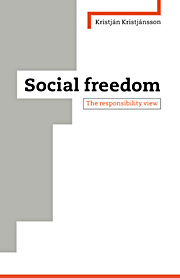Book contents
- Frontmatter
- Contents
- Acknowledgements
- 1 Introduction: freedom from Berlin onwards
- 2 Negative freedom: the nature of constraints
- 3 Obstacles and their weight
- 4 The test of moral responsibility
- 5 Internal bars and positive liberty
- 6 Freedom and power
- 7 Observations on method
- 8 Concluding remarks
- Bibliography
- Index
7 - Observations on method
Published online by Cambridge University Press: 31 March 2010
- Frontmatter
- Contents
- Acknowledgements
- 1 Introduction: freedom from Berlin onwards
- 2 Negative freedom: the nature of constraints
- 3 Obstacles and their weight
- 4 The test of moral responsibility
- 5 Internal bars and positive liberty
- 6 Freedom and power
- 7 Observations on method
- 8 Concluding remarks
- Bibliography
- Index
Summary
The last chapter of the main body of this study will be devoted to questions of method. That is, after having, so to speak, delivered the goods, I plan to scrutinise the methodology which has, to a large degree implicitly, been employed in the course of the discussion. The spur to the study was my dissatisfaction with the fact that debates about freedom seldom get off the conceptual ground; the opposing parties do not agree to start with on the meaning of that about which they could disagree, and the opportunity for a fruitful discussion is lost. It may be called naive or old-fashioned, but my belief was (and still is) that an account of social freedom could be proposed which would commend itself to any rational thinker and serve as a natural point of departure for substantive debates.
Admittedly, arguments have so far been launched, and conclusions reached, with a certain complacency toward the methodological hazards which are often taken to bedevil conceptual studies. It must be said that the development of my arguments would have been somewhat more cautious if I had felt genuinely intimidated by these hazards. I have not. However, I can envisage someone objecting that I have been so absorbed in creating a piece of workmanship that I have plunged ahead without giving serious thought to the question whether the tools being employed were appropriate.
- Type
- Chapter
- Information
- Social FreedomThe Responsibility View, pp. 166 - 205Publisher: Cambridge University PressPrint publication year: 1996



